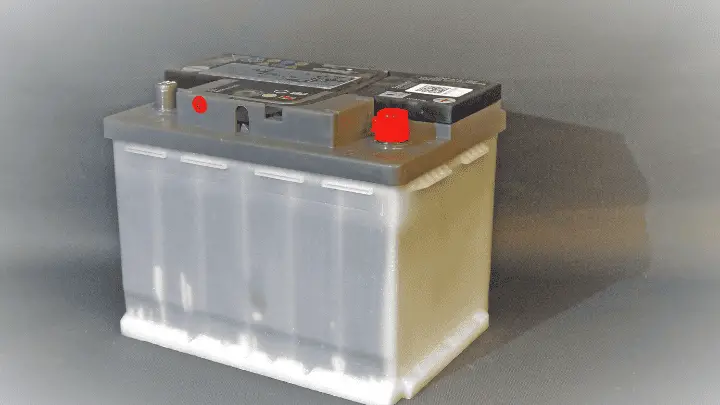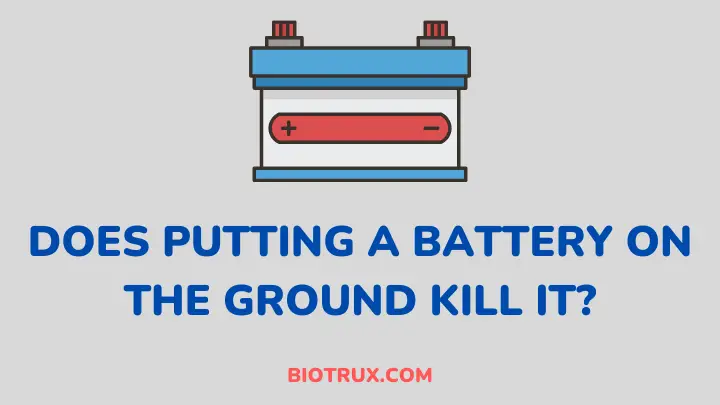Batteries are essential in our modern-day lives. We rely on them to power our smartphones, laptops, and cars. But have you ever wondered if something as simple as putting a battery on the ground could potentially kill it?
It is a common misconception that placing a battery on the ground can lead to its demise. Some believe contact with the ground can cause a short circuit or drain the battery’s energy. But is this claim rooted in truth or simply an old wives’ tale?
So, does putting a battery on the ground kill it? The short answer is no. However, there are some important things to remember regarding your batteries’ longevity and functionality.
In this article, you’ll look at batteries and answer all your questions about putting them on the ground. Hence, you can get the most out of your battery.
So, let’s get started.
Does Putting a Battery on the Ground Really Kill It?
Exploring the myth
There is a long-standing belief that placing a battery on the ground will drain its energy and kill it. This is nothing more than a myth. The truth is that the surface on which the battery is placed does not impact its ability to function.
The myth likely originated from the fact that certain types of batteries, such as those found in vehicles, can be drained when not used for long periods. However, this has nothing to do with whether they are on the ground.
Placing a battery on the ground will not kill it, but proper storage is crucial to ensure it functions when needed.
The truth behind the myth
Contrary to popular belief, putting a battery on the ground does not kill it. Modern batteries are designed with protective layers and insulating materials that prevent them from discharging or becoming damaged due to contact with the ground.
Batteries are typically made of metal, such as zinc or lithium, and contain chemicals that react to produce electricity. The outer casing of a battery is usually made of plastic or metal, which insulates it from the ground.
As a result, placing a battery on the ground does not pose any danger to its functionality or lifespan. However, it is important to note that exposing a battery to extreme temperatures, moisture, or other damaging conditions can negatively affect its performance.
It is always recommended to store batteries in a cool, dry place and avoid exposing them to any harmful elements. Rest assured that your batteries will remain safe and functional if you handle them properly and provide suitable storage conditions.
Factors Affecting Battery Performance
While placing a battery on the ground does not kill it, other factors can affect battery performance and lifespan. Let’s explore some of these factors:
1. Temperature
Extreme temperatures can have a significant impact on battery performance. High and low temperatures can affect the chemical reactions inside the battery, leading to reduced efficiency and capacity.
It’s advisable to store and use batteries within the recommended temperature range to ensure optimal performance.
2. Humidity
Excessive humidity can cause corrosion and damage to the battery contacts and terminals. This can result in poor electrical connections and reduced battery performance. It’s important to keep batteries dry and avoid exposure to high-humidity environments.
3. Storage conditions
Proper storage is essential for maintaining battery health. Storing batteries in a cool, dry place can help prolong their lifespan. Avoid exposing batteries to direct sunlight, increasing the temperature and leading to accelerated degradation.
4. Battery type
Different battery chemistries have varying characteristics and requirements. It’s important to understand the specific needs of the battery you are using.
For example, rechargeable batteries may require periodic charging to maintain capacity, while disposable batteries are designed for single use.
Tips to Extend Your Car Battery Life Regardless of Ground Contact

1. Avoid frequent short trips: Frequent short trips can prevent your car’s battery from fully recharging. If possible, combine your trips or use a different mode of transportation for short journeys.
2. Turn off unnecessary electrical components: Turn off all unnecessary electrical components when the engine is off, such as lights, radios, and air conditioning, to reduce the strain on the battery.
3. Keep your battery terminals clean: Clean the battery terminals with a wire brush and a mixture of baking soda and water regularly. Dirty terminals can impede the battery’s charging process.
4. Check your battery regularly: Regularly check your battery’s charge levels and make sure it’s not leaking or damaged. Most batteries have a lifespan of three to five years.
5. Park in a garage: Parking your car in a garage or under a shade tree can help keep the battery cooler and prevent it from draining quickly.
6. Avoid using high-tech devices when your car is off. High-tech devices such as navigation and entertainment systems can drain your battery even when the car is not running. Avoid using these devices when your car is off.
7. Disconnect the battery when not in use: If you plan to leave your car parked for an extended period, consider disconnecting it to prevent it from draining unnecessarily.
Note: These tips are meant to help extend the life of your car’s battery. However, if you are experiencing battery problems or are unsure how to maintain your battery, it’s always best to consult a professional mechanic.
FAQs
Can you safely store batteries on the ground?
Yes, you can safely store batteries on the ground. As mentioned earlier, the myth that placing batteries on the ground can kill them is unfounded. However, storing batteries in a cool, dry place is still advisable to ensure longevity.
Are there any risks associated with placing batteries on the ground?
Placing batteries on the ground poses minimal risks. The main concern should be avoiding extreme temperatures, high humidity, and physical damage, rather than the contact between the battery and the ground itself.
Can batteries discharge if they touch each other on the ground?
Batteries can discharge if they come into direct contact, regardless of whether on the ground or any other surface. It’s important to prevent the terminals of batteries from touching each other to avoid unintended discharge.
Do battery cases provide sufficient insulation?
Yes. Battery cases are designed to provide insulation and protect the battery from external elements. The materials used in battery cases are selected to prevent accidental discharges and damage.
Can a discharged battery be revived by placing it on the ground?
Placing a discharged battery on the ground has no restorative effects. To revive a discharged battery, it’s best to recharge it using the appropriate charging method recommended by the battery manufacturer.
Wrapping Up
In conclusion, putting a battery on the ground for an extended period is not advisable. Doing so can damage the battery and reduce its lifespan. While many believe putting a battery on the ground can discharge it, this is not entirely true.
Batteries discharge due to internal chemical reactions, and not because they are on the ground. However, leaving batteries on the ground can cause them to accumulate dirt and moisture, which can lead to corrosion and leakage.
This can be especially problematic for rechargeable batteries, which can lose their ability to hold a charge if exposed to moisture or other contaminants. To ensure that your batteries last as long as possible, store them in a cool, dry place and avoid leaving them on the ground.
If you must store batteries on the ground, place them in a sealed container or bag to protect them from dirt and moisture. Remember, taking care of your batteries is an investment in your electronics and wallet.
Do you think your car battery drains fast? Here are signs you need to replace your battery.
Thanks for reading.

